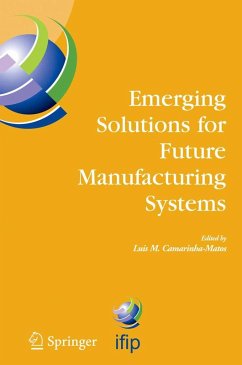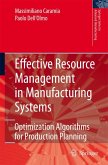FUTURE MANUFACTURING SYSTEMS
Edited by: Luis M. Camarinha-Matos
Industries and particularly the manufacturing sector have been facing difficult challenges in a context of socio-economic turbulence which is characterized by complexity as well as the speed of change in causal interconnections in the socio-economic environment. In order to respond to these challenges companies are forced to seek new technological and organizational solutions. Information technology plays a fundamental role in this process but sustainable advances in industry also need to consider the human aspects, what led to the concept of "balanced automation systems" in an attempt to center the discussion on the balance between the technical aspects of automation and the human and social facets. Similar challenges are faced by the service sector.
In this context two main characteristics emerge as key properties of a modern automation system - agility and distribution. Agility because systems need not only to be flexible in order to adjust to a number of a-priori defined scenarios, but rather must cope with unpredictability. Distribution in the sense that automation and business processes are becoming distributed and supported by collaborative networks. These networks can be observed at the inter-enterprise collaboration level, but also at the shop floor level where more and more control systems are designed as networks of autonomous and collaborative nodes. Multi-agent, holonic and intelligent systems approaches play, naturally, a major role here. Advances in communications and ubiquitous computing, including the new wireless revolution, are fundamental enablers for these processes.
This book includes the papers selected for the BASYS'04 conference, which was held in Vienna, Austria in September 2004 and sponsored by the International Federation for Information Processing (IFIP).
Emerging Solutions for Future Manufacturing Systems is essential reading for researchers and engineering students in production engineering, computer science, collaborative networks, artificial intelligence, electrical engineering, mechanical engineering, and industrial sociology, as well as for engineers, industrial managers and practitioners in manufacturing and service provision systems organization and planning.
Dieser Download kann aus rechtlichen Gründen nur mit Rechnungsadresse in A, B, BG, CY, CZ, D, DK, EW, E, FIN, F, GR, HR, H, IRL, I, LT, L, LR, M, NL, PL, P, R, S, SLO, SK ausgeliefert werden.









